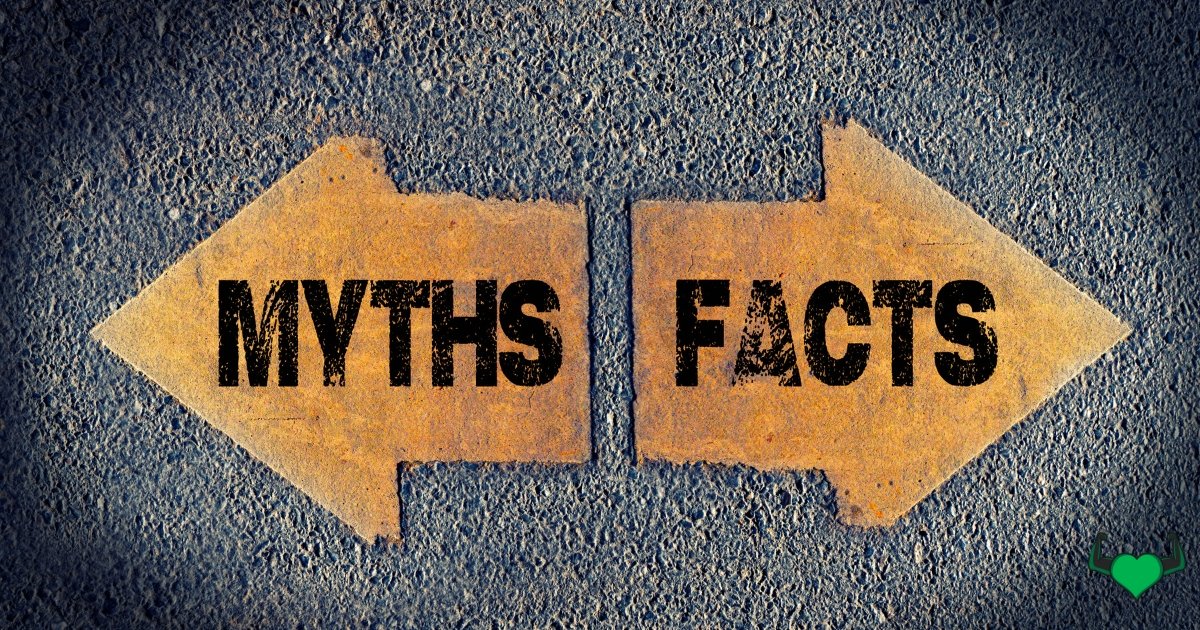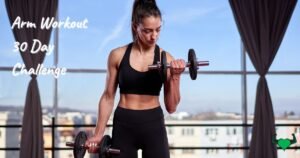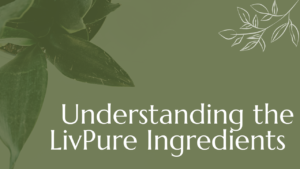Are you curious about going vegan but worried it might affect your fitness goals? You’re not alone! There are countless myths floating around about vegan diets and fitness—like how you can’t build muscle without meat or won’t have enough energy for workouts. But what if I told you these are just myths? In this article, we’ll dive deep into these misconceptions and reveal the real benefits of a plant-based diet for fitness enthusiasts. So, let’s bust these myths wide open and get you the facts you need!
Myth 1: Vegans Can’t Build Muscle

Explanation of the myth and why it persists
The myth that vegans can’t build muscle persists primarily due to misconceptions about protein sources and the belief that only animal-based proteins are sufficient for muscle growth. Many assume that plant-based proteins are incomplete or inadequate, leading to fears of muscle loss or inadequate nutrition. This myth is further fueled by a lack of awareness about the rich variety of high-protein vegan foods and successful vegan athletes who defy these stereotypes. However, evidence shows that a well-planned vegan diet can provide all the necessary nutrients to support muscle growth and fitness, effectively debunking this aspect of vegan fitness myths.
Key sources of plant-based protein
Key sources of plant-based protein that help debunk vegan fitness myths include lentils, chickpeas, beans, tofu, tempeh, edamame, quinoa, seitan, hemp seeds, chia seeds, and nuts like almonds and peanuts. Additionally, whole grains like oats and brown rice, along with vegetables such as spinach and broccoli, provide substantial protein. These foods offer a complete range of amino acids, especially when combined, ensuring vegans can meet their protein needs for muscle growth and fitness.
Real-life examples of vegan athletes
Real-life examples of vegan athletes who bust vegan fitness myths include Patrik Baboumian, a record-holding strongman known for his incredible strength; Venus Williams, a tennis champion who switched to a vegan diet for health reasons; and Scott Jurek, an ultramarathon runner who has achieved multiple endurance records. Additionally, bodybuilders like Nimai Delgado and crossfit athletes like Jeremy Reijnders prove that a plant-based diet supports muscle growth, energy, and top athletic performance, debunking the myths surrounding vegan fitness.
Tips for optimizing muscle growth on a vegan diet
To optimize muscle growth on a vegan diet, focus on consuming a variety of high-protein foods like lentils, beans, tofu, seitan, and quinoa to ensure a complete amino acid profile. Eat balanced meals with complex carbs and healthy fats for sustained energy and recovery. Incorporate protein-rich snacks before and after workouts, and consider plant-based protein supplements if needed. Stay hydrated and monitor your intake of key nutrients like B12, iron, and omega-3s to prevent deficiencies. By following these tips, you can effectively debunk vegan fitness myths and achieve your muscle growth goals.
Myth 2: Vegan Diets Lack Sufficient Protein
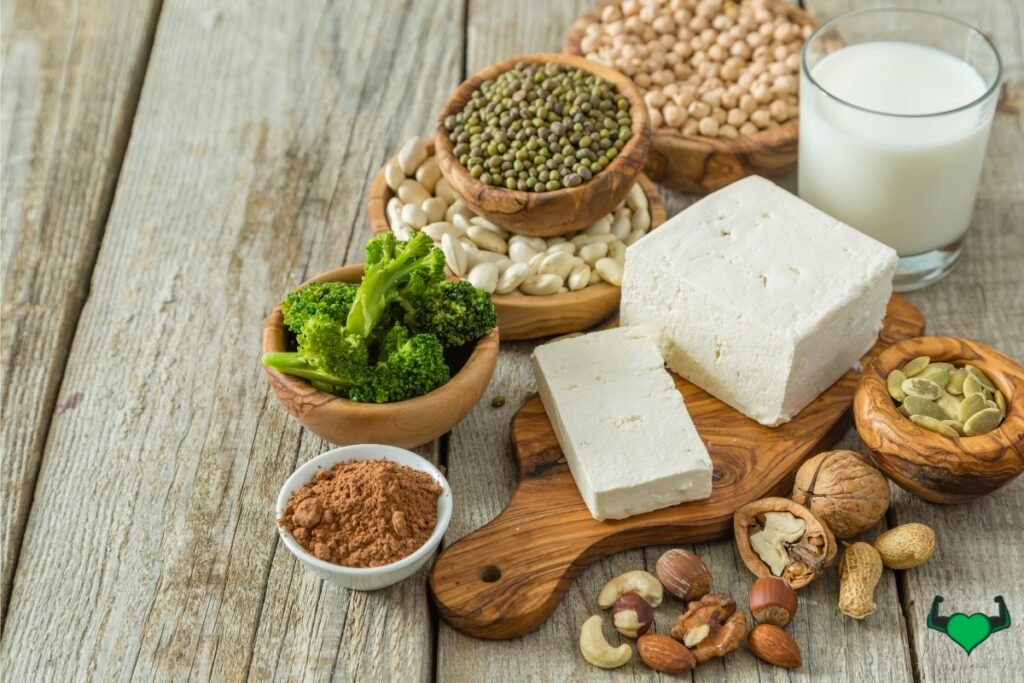
Understanding protein needs for fitness
Understanding protein needs for fitness is crucial to debunking vegan fitness myths. The general guideline for muscle maintenance and growth is about 1.2 to 2.2 grams of protein per kilogram of body weight, depending on activity level and fitness goals. Contrary to the myth that vegans can’t meet these needs, plant-based diets can provide ample protein through diverse sources like legumes, grains, nuts, seeds, and vegetables. Combining different protein-rich foods ensures a complete amino acid profile, supporting muscle repair, growth, and overall fitness.
High-protein vegan foods and meal ideas
High-protein vegan foods that debunk vegan fitness myths include lentils, chickpeas, tofu, tempeh, seitan, quinoa, edamame, hemp seeds, chia seeds, and nutritional yeast. For meal ideas, try a chickpea and quinoa salad, tofu stir-fry with vegetables, lentil soup, tempeh tacos, or a smoothie bowl topped with nuts, seeds, and a scoop of plant-based protein powder. These meals provide a variety of nutrients and are ideal for meeting protein needs to support fitness goals.
How plant-based proteins compare to animal proteins
Plant-based proteins can effectively support fitness goals, challenging common vegan fitness myths. While animal proteins are considered “complete” because they contain all essential amino acids, many plant-based proteins like quinoa, soy, and hemp seeds are also complete. Other plant proteins, like those from beans, lentils, and grains, are “incomplete,” but consuming a variety of these throughout the day ensures a full amino acid profile. Studies show that plant-based proteins are just as effective as animal proteins for muscle growth and recovery when overall protein intake is adequate.
Debunking the protein deficiency myth with scientific evidence
The protein deficiency myth in vegan diets is debunked by scientific evidence showing that most people, including vegans, easily meet their protein needs with a varied diet. Studies reveal that plant-based diets, rich in foods like legumes, grains, nuts, and seeds, provide adequate protein for muscle growth and fitness. Research also confirms that plant proteins can support muscle mass and strength gains similarly to animal proteins. Additionally, vegan athletes thrive on plant-based diets, proving that protein deficiency is a misconception rather than a reality, effectively debunking these vegan fitness myths.
American Dietetic Association (ADA) Position Paper on Vegetarian Diets: The ADA states that well-planned vegetarian and vegan diets, including a variety of plant-based foods, are nutritionally adequate and can support muscle growth and strength. They emphasize that protein needs can be met through plant-based sources when a variety of foods are consumed.
Source: American Dietetic Association
Journal of the International Society of Sports Nutrition (JISSN) Study: This study concludes that a plant-based diet provides all the necessary nutrients, including protein, for athletes. It also found that vegan athletes can achieve similar muscle mass and strength gains as those consuming animal-based diets, debunking myths about protein deficiency.
Source: Journal of the International Society of Sports Nutrition
Myth 3: Vegans Have Low Energy Levels

Exploring the misconception about energy and plant-based diets
The misconception that plant-based diets lead to low energy levels is one of the most common vegan fitness myths. In reality, plant-based diets are rich in complex carbohydrates, which provide a steady source of energy throughout the day. Foods like whole grains, legumes, fruits, and vegetables supply vital nutrients and fiber, supporting sustained energy and endurance. Studies show that plant-based diets can improve cardiovascular health and boost energy efficiency in athletes. The key is to ensure a balanced intake of macronutrients—carbs, proteins, and fats—to maintain optimal energy levels for fitness and performance.
The role of complex carbs and healthy fats in sustaining energy
Complex carbs and healthy fats play a crucial role in sustaining energy, debunking vegan fitness myths about low energy levels on plant-based diets. Complex carbs from sources like whole grains, quinoa, and sweet potatoes provide slow-releasing glucose, fueling workouts and maintaining stable blood sugar. Healthy fats from avocados, nuts, seeds, and olive oil are vital for longer-lasting energy, hormone production, and nutrient absorption. Together, these macronutrients help keep energy levels consistent, supporting peak performance and endurance for vegan athletes.
Vegan pre- and post-workout meal suggestions
For a vegan pre-workout meal, try oatmeal with bananas, chia seeds, and a drizzle of maple syrup for sustained energy, or a smoothie with spinach, berries, and plant-based protein powder. For post-workout recovery, opt for a lentil and quinoa salad with roasted vegetables, or a tofu stir-fry with brown rice and broccoli to replenish glycogen and support muscle repair. These meal suggestions provide balanced macronutrients to fuel workouts and promote recovery, debunking vegan fitness myths around inadequate nutrition for athletes.
Case studies of high-performance vegan athletes
Case studies of high-performance vegan athletes help debunk vegan fitness myths. Scott Jurek, an ultramarathoner, has set multiple records, including the fastest known time on the Appalachian Trail, all on a vegan diet. Olympic weightlifter Kendrick Farris follows a vegan diet and has represented the U.S. in three Olympic Games. These examples show that a well-planned vegan diet supports peak athletic performance and endurance.
Myth 4: Vegan Diets Are Deficient in Essential Nutrients

Common nutrients of concern (e.g., B12, Iron, Omega-3)
Common nutrients of concern in vegan diets include B12, iron, and omega-3, which are often cited in vegan fitness myths. Vitamin B12, essential for nerve function and red blood cell production, isn’t naturally found in plant foods but can be obtained from fortified foods or supplements. Iron, crucial for oxygen transport, is abundant in beans, lentils, and spinach; pairing with vitamin C-rich foods enhances absorption. Omega-3s, important for heart and brain health, can be sourced from flaxseeds, chia seeds, hemp seeds, and algae supplements. With proper planning, vegans can easily meet their nutrient needs.
Vegan-friendly sources for these nutrients
Vegan-friendly sources for nutrients commonly cited in vegan fitness myths include:
- Vitamin B12: Fortified foods like plant-based milk, cereals, and nutritional yeast, or B12 supplements.
- Iron: Lentils, chickpeas, tofu, quinoa, spinach, and seeds; enhance absorption with vitamin C-rich foods like bell peppers and oranges.
- Omega-3s: Flaxseeds, chia seeds, hemp seeds, walnuts, and algae-based supplements.
These sources provide all essential nutrients, proving that a vegan diet can be nutritionally complete and support fitness goals.
How to balance your diet to meet all nutrient needs
To balance your diet and meet all nutrient needs on a vegan diet, include a variety of whole foods: consume legumes, grains, nuts, seeds, fruits, and vegetables daily to cover protein, fiber, and essential vitamins. Incorporate fortified foods or supplements for B12, omega-3s from flaxseeds or algae, and iron-rich foods paired with vitamin C for absorption. Focus on diverse sources to ensure a full amino acid profile and adequate intake of calcium, zinc, and iodine. This balanced approach dispels vegan fitness myths and supports overall health and fitness goals.
Addressing concerns with supplementation
Addressing concerns with supplementation is key to debunking vegan fitness myths. Vegans may need supplements for nutrients less available in plant foods, like B12, which is critical for nerve function, and possibly D3, iron, and omega-3s, depending on individual needs. Supplements are a practical solution to ensure a complete nutrient profile, supporting fitness and overall health. Using reputable brands and consulting a healthcare professional can help personalize supplementation to meet specific dietary needs, ensuring a balanced vegan diet without deficiencies.
Myth 5: Vegan Diets Lead to Poor Recovery Times
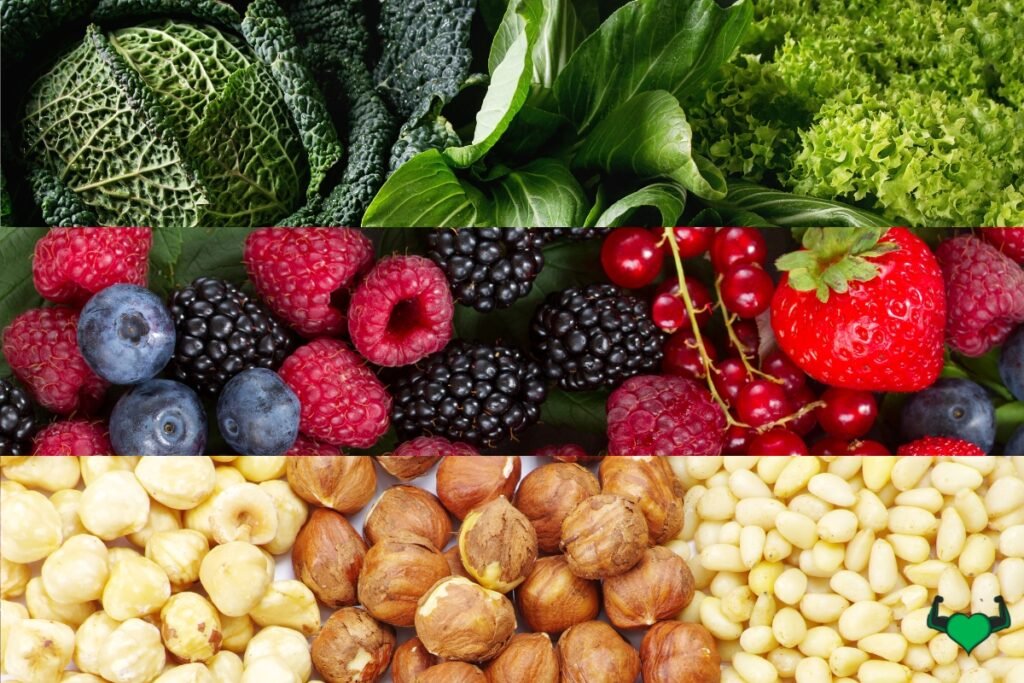
How plant-based diets can actually aid in faster recovery
Plant-based diets can aid in faster recovery by providing high levels of antioxidants, vitamins, and minerals that reduce inflammation and oxidative stress—key factors in muscle recovery. Foods like berries, leafy greens, nuts, seeds, and legumes contain anti-inflammatory compounds that help repair muscle damage and reduce soreness. Additionally, the fiber-rich nature of these diets supports gut health, which is linked to better nutrient absorption and immune function. These benefits challenge vegan fitness myths by showing how plant-based diets can enhance recovery and overall athletic performance.
Anti-inflammatory benefits of a vegan diet
A vegan diet offers significant anti-inflammatory benefits, countering vegan fitness myths about recovery and performance. Plant-based foods like fruits, vegetables, nuts, seeds, and whole grains are rich in antioxidants, vitamins, and phytochemicals that help reduce inflammation in the body. Lower inflammation levels can lead to quicker recovery, reduced muscle soreness, and decreased risk of injury. The absence of pro-inflammatory animal fats further supports this, making a vegan diet ideal for athletes looking to optimize recovery and maintain peak fitness.
Foods that support muscle recovery and reduce soreness
Foods that support muscle recovery and reduce soreness, debunking vegan fitness myths, include berries (rich in antioxidants), leafy greens like spinach (anti-inflammatory properties), and nuts and seeds (healthy fats and protein). Turmeric and ginger have natural anti-inflammatory effects, while foods like lentils, chickpeas, and quinoa provide plant-based protein for muscle repair. Including these foods in a balanced vegan diet can enhance recovery and help maintain fitness levels.
Myth 6: Vegan Diets Are Only for Weight Loss

Addressing misconceptions about veganism and weight gain
Addressing misconceptions about veganism and weight gain is key to debunking vegan fitness myths. Contrary to the belief that vegan diets are only for weight loss, vegans can achieve weight gain by focusing on calorie-dense, nutrient-rich foods like nuts, seeds, avocados, whole grains, and legumes. Including healthy fats, complex carbs, and adequate protein ensures a caloric surplus for muscle growth or weight maintenance. With proper planning and meal balance, a vegan diet can support diverse fitness goals, including healthy weight gain.
How to gain or maintain weight on a vegan diet
To gain or maintain weight on a vegan diet, focus on consuming calorie-dense, nutrient-rich foods like nuts, seeds, avocados, dried fruits, whole grains, and legumes. Include healthy fats (like olive oil and nut butters) and complex carbs in meals to boost caloric intake. Eating frequent meals and snacks, incorporating smoothies with added protein, and using high-calorie ingredients like coconut milk or tahini can help achieve a caloric surplus. This approach dispels vegan fitness myths by proving that a vegan diet can support healthy weight gain and muscle growth effectively.
Customizing a vegan meal plan for different fitness goals
Customizing a vegan meal plan for different fitness goals involves adjusting macronutrient ratios to match your objectives. For muscle gain, prioritize high-protein foods like tofu, lentils, quinoa, and tempeh, along with calorie-dense sources like nuts and whole grains, to ensure a caloric surplus. For weight loss or maintenance, focus on fiber-rich foods like vegetables, fruits, and legumes to keep you full while managing caloric intake. To boost endurance, incorporate complex carbs such as sweet potatoes, oats, and brown rice. Tailoring your vegan diet this way counters vegan fitness myths, proving it can effectively meet diverse fitness needs.
Real-world examples of vegan bodybuilders and strength athletes
Real-world examples of vegan bodybuilders and strength athletes debunk vegan fitness myths. Patrik Baboumian, a world-record-holding strongman, has built exceptional strength entirely on a vegan diet. Nimai Delgado, an IFBB Pro bodybuilder, has never consumed meat and promotes plant-based nutrition for muscle growth. Torre Washington, another professional bodybuilder, has thrived on a vegan diet since 1998. These athletes prove that a well-planned vegan diet supports muscle development, strength, and peak athletic performance.
Tips for Vegan Fitness Success

Practical advice for transitioning to a vegan fitness diet
For transitioning to a vegan fitness diet, start by gradually replacing animal products with plant-based alternatives like tofu, legumes, and whole grains. Focus on balanced meals with protein, complex carbs, and healthy fats to meet fitness needs. Experiment with high-protein vegan foods, such as tempeh, lentils, and quinoa, and use fortified foods or supplements for nutrients like B12 and omega-3s. Plan meals and snacks ahead to ensure variety and adequate caloric intake. Staying hydrated and listening to your body’s needs will help maintain energy and performance, countering common vegan fitness myths.
Meal planning and prep strategies
Meal planning and prep strategies can help counter vegan fitness myths by ensuring you meet nutritional needs efficiently. Start by creating a weekly meal plan that includes a variety of protein-rich foods like beans, lentils, tofu, and quinoa. Prep staples like grains, roasted vegetables, and protein sources in bulk for easy assembly of balanced meals. Incorporate snacks like nuts, seeds, and fruit to maintain energy levels. Store prepped meals in portioned containers for convenience, and utilize batch cooking to save time. These strategies help maintain consistency in nutrition and support your fitness goals.
The importance of hydration and mindful eating
Hydration and mindful eating are crucial for dispelling vegan fitness myths and achieving optimal performance. Staying hydrated helps maintain energy levels, supports digestion, and aids in muscle recovery. Aim to drink water consistently throughout the day, especially before, during, and after workouts. Mindful eating ensures you consume balanced meals, recognize hunger cues, and avoid overeating. Focusing on nutrient-dense, whole foods helps meet all nutritional needs on a vegan diet, supporting fitness goals and overall health effectively.
Resources for further reading and support communities
For further reading and support on vegan fitness myths, explore resources like “The Plant-Based Athlete” by Matt Frazier and Robert Cheeke, which provides expert advice on vegan nutrition for athletes. Online communities such as the No Meat Athlete and Vegan Bodybuilding & Fitness forums offer support, meal plans, and success stories. Websites like NutritionFacts.org and The Vegan Society provide evidence-based information on plant-based nutrition, helping you stay informed and connected with others pursuing similar fitness goals.
Conclusion
The myths about vegan fitness have been around for far too long, but as we’ve seen, they don’t hold up under scrutiny! Whether it’s building muscle, maintaining energy levels, or achieving your fitness goals, a well-planned vegan diet can provide all the necessary nutrients and benefits. Now that these myths have been busted, are you ready to embrace a plant-based fitness lifestyle? Take the plunge and discover a new world of health and vitality!

